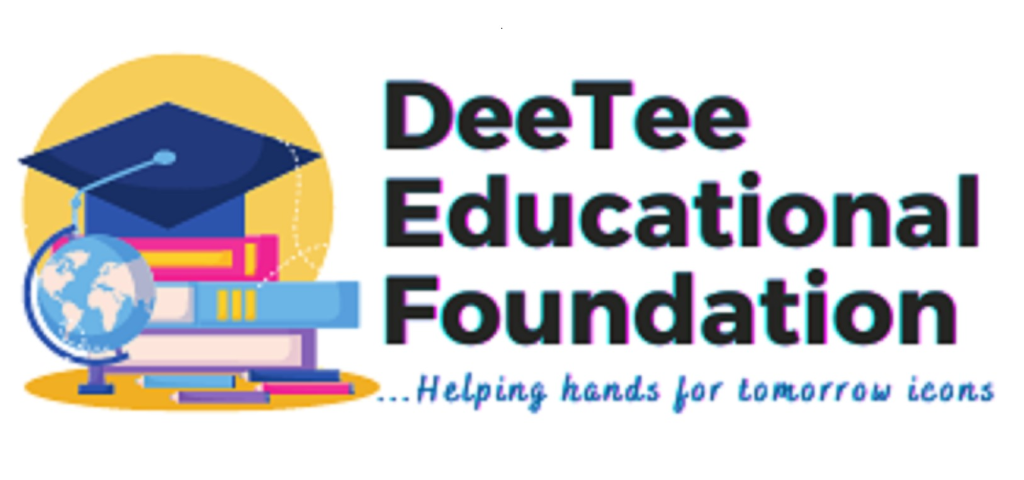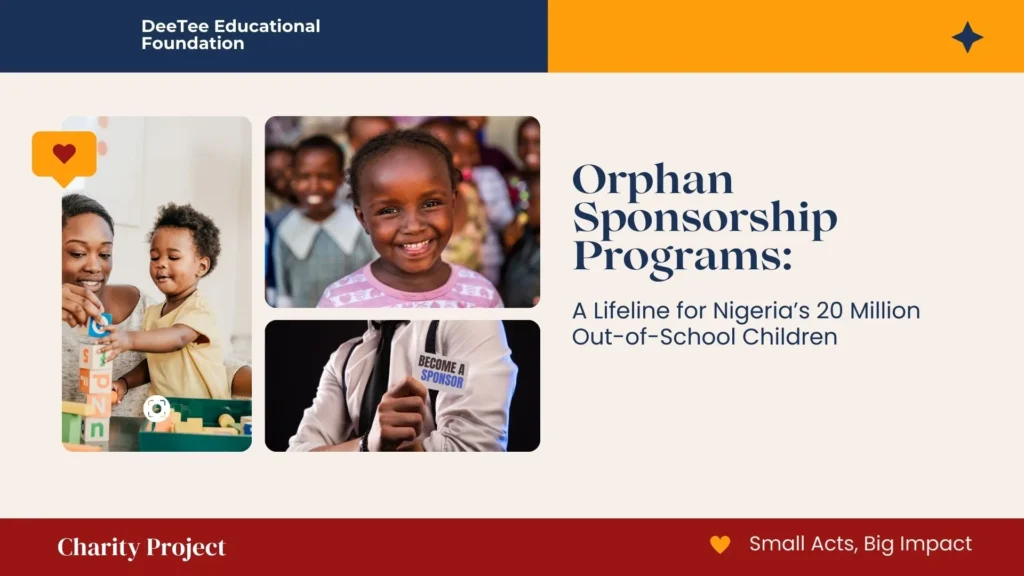In Nigeria, a country rich in culture and resources, there lies a stark contrast—a looming educational crisis that threatens the future of millions of children. With over 20 million out-of-school children, Nigeria has the highest number of children not receiving formal education in sub-Saharan Africa. The reasons for this are numerous, but one stands out prominently: a severe lack of educational resources. Among these children, orphans and those from underprivileged backgrounds are particularly vulnerable. However, there is hope in the form of orphan sponsorship programs, which offer a beacon of light in an otherwise bleak situation.
Understanding the Scope of the Problem
Nigeria’s Educational Crisis: A Snapshot
Nigeria’s education system is plagued by challenges, with the most pressing being the high number of children who are not in school. According to recent statistics, 20 million children in Nigeria are out of school. This figure is alarming, especially when compared to other countries in the region. The consequences of this crisis are far-reaching, affecting not only the individual children but also the nation’s overall development and future prospects.
Why Are So Many Children Out of School?
Several factors contribute to the high number of out-of-school children in Nigeria. Poverty is a major barrier, preventing families from affording school fees, uniforms, and other essentials. Lack of infrastructure, such as schools in rural areas, further exacerbates the problem. Additionally, conflict and insecurity in certain regions make it unsafe for children to attend school. However, one of the most significant barriers is the lack of textbooks and learning materials, which affects over 80% of out-of-school children. Without these basic resources, education remains out of reach for many.
The Impact on Orphans and Vulnerable Children
Among the 20 million out-of-school children in Nigeria, orphans and children from underprivileged backgrounds are disproportionately affected. These children often lack the financial support and stability needed to access education. They are more likely to be forced into child labor or early marriage, further reducing their chances of receiving an education. This makes them particularly vulnerable to a cycle of poverty that is difficult to break without intervention.
The Role of Orphan Sponsorship Programs
What Are Orphan Sponsorship Programs?
Orphan sponsorship programs are initiatives designed to provide financial and educational support to orphans and vulnerable children. These programs typically involve individuals or organizations sponsoring a child, covering the costs of their education, including school fees, uniforms, textbooks, and other necessary supplies. In some cases, these programs also provide additional support, such as healthcare, nutritional aid, and mentoring.
How Do These Programs Work?
The mechanics of orphan sponsorship programs are relatively straightforward. Sponsors commit to supporting a child financially, usually on a monthly or yearly basis. This support is then channeled through a coordinating organization, which ensures that the child’s educational needs are met. In return, sponsors often receive regular updates on the child’s progress, including letters, photographs, and reports. This creates a personal connection between the sponsor and the child, fostering a sense of responsibility and mutual benefit.
The Impact of Sponsorship on Children’s Lives
The impact of orphan sponsorship programs on the lives of children cannot be overstated. Education is a powerful tool that can break the cycle of poverty and open up new opportunities. For many of these children, sponsorship is the only way they can access quality education. It provides them with the resources they need to attend school, including textbooks, uniforms, and other essential supplies. Additionally, sponsorship programs often offer emotional and psychological support, helping children to overcome the trauma of losing their parents and building their self-esteem.
Success Stories: Real-Life Examples
Transforming Lives Through Education
There are countless success stories that highlight the transformative power of orphan sponsorship programs. For instance, consider the story of Amina, a young girl from northern Nigeria. After losing her parents at a young age, Amina was left to fend for herself, with no means of attending school. Through an orphan sponsorship program, Amina received the financial support she needed to enroll in school. Today, she is a top student in her class and aspires to become a teacher, determined to give back to her community. Amina’s story is just one example of how sponsorship can change the trajectory of a child’s life.
Building a Brighter Future
Another inspiring example is that of David, a boy from Lagos who was orphaned at a young age. With no access to education, David’s future looked bleak. However, through the support of a sponsorship program, David was able to attend school and pursue his passion for engineering. Today, he is a college freshman studying engineering and dreams of designing infrastructure that will benefit his community. David’s success is a testament to the power of education and the opportunities that sponsorship can provide.
Challenges Faced by Orphan Sponsorship Programs
Sustaining Long-Term Support
While orphan sponsorship programs have proven to be effective, they are not without challenges. One of the main difficulties is ensuring sustained support for the children. Sponsorship commitments can be long-term, and maintaining the financial and emotional investment over several years can be challenging for sponsors. It is essential for sponsoring organizations to provide ongoing communication and engagement opportunities to keep sponsors connected and committed to the child’s education.
Ensuring Transparency and Accountability
Another challenge faced by orphan sponsorship programs is ensuring transparency and accountability. Sponsors need to trust that their contributions are being used effectively and that the children are receiving the support they need. This requires robust monitoring and reporting systems, as well as clear communication between the sponsoring organization and the sponsors. Ensuring that the children’s needs are met and that funds are used appropriately is crucial to the success of these programs.
Addressing the Root Causes
While sponsorship programs provide immediate relief and support to vulnerable children, they do not address the root causes of the educational crisis in Nigeria. Issues such as poverty, lack of infrastructure, and insecurity require systemic changes and long-term solutions. Sponsorship programs should be seen as part of a broader strategy to improve access to education in Nigeria, alongside efforts to address these underlying issues.
The Role of Government and NGOs
Government Initiatives and Policies
The Nigerian government has a crucial role to play in addressing the educational crisis. Government initiatives aimed at improving access to education, such as the Universal Basic Education (UBE) program, are essential. However, more needs to be done to ensure that these programs reach the most vulnerable children, including orphans. The government must also invest in infrastructure, teacher training, and resources to support the education system as a whole.
The Contribution of NGOs and International Organizations
Non-governmental organizations (NGOs) and international organizations also play a vital role in supporting orphan sponsorship programs. These organizations often provide the infrastructure and coordination needed to connect sponsors with children in need. They also advocate for policy changes and work to raise awareness of the issues facing out-of-school children in Nigeria. Collaborations between the government, NGOs, and international organizations are essential to creating a sustainable solution to the educational crisis.
The Importance of Early Career Mentorship
Preparing Students for Success
In addition to providing educational resources, orphan sponsorship programs often include early career mentorship. This is a critical component of preparing students for success in their future careers. Mentorship programs provide guidance, support, and opportunities for students to explore different career paths and develop the skills they need to succeed. By connecting students with mentors in their chosen fields, these programs help to build confidence and provide valuable insights into the professional world.
Building a Network of Support
Mentorship also helps to build a network of support for students as they transition from education to employment. This network can provide valuable connections, advice, and encouragement as students navigate the challenges of starting their careers. For many orphaned and vulnerable children, who may lack family support, this mentorship can be a lifeline, helping them to achieve their goals and build a successful future.
How to Get Involved
Becoming a Sponsor
If you are interested in making a difference in the lives of Nigeria’s out-of-school children, becoming a sponsor is one of the most impactful ways to get involved. By sponsoring a child, you can provide the financial support needed to give them access to education and a brighter future. Many organizations offer sponsorship programs, and the process is usually straightforward. As a sponsor, you will receive regular updates on the child’s progress and have the opportunity to build a personal connection with them.
Supporting Orphan Sponsorship Programs
In addition to sponsoring a child, there are other ways to support orphan sponsorship programs. Donations to sponsoring organizations help to cover administrative costs, provide additional resources, and expand the reach of these programs. Volunteering your time or expertise to these organizations can also make a significant impact. By raising awareness of the educational crisis in Nigeria and advocating for the importance of sponsorship, you can help to bring about positive change.
Conclusion
Orphan sponsorship programs are a lifeline for Nigeria’s 20 million out-of-school children, offering them the opportunity to receive an education and build a better future. While these programs face challenges, their impact is undeniable, transforming the lives of vulnerable children and breaking the cycle of poverty. By supporting these programs, we can help to ensure that every child in Nigeria has the chance to access quality education and reach their full potential. Education is the key to unlocking a brighter future for all, and orphan sponsorship programs are an essential part of making that future a reality.

